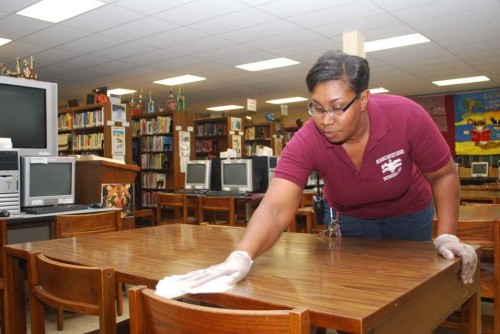September
September 1, 2009Sept. 3
September 3, 2009Though there have been no reports of the H1N1 virus in Tri-parish school systems, many parents are concerned with the spread of the virus now that school is back in session and flu season is nearing.
However, local healthcare providers and school officials said parents can educate their children on some simple but highly effective activities to help reduce the spread of infection to keep children healthy and in the classroom.
Local school superintendents Philip Martin and Jo Ann Matthews said they are following the guidelines detailed in a report from the state Department of Health and Hospitals and the Centers for Disease Control.
The CDC encourages the following activities:
• Wash hands frequently with soap and water for 20 seconds (long enough to sing the “Happy Birthday” song twice).
• Use hand sanitizer.
• Cough and sneeze into a tissue, not the hand. Children often forget to wash their hands after covering their mouth.
“Parents and teachers can help with the prevention of H1N1 by encouraging frequent hand-washing and the use of hand sanitizer,” Angelique Torres, a nurse practitioner at Ochsner St. Anne General Hospital, said.
“Good health habits can prevent the spread of germs which will help prevent the spread of the H1N1 virus,” Lauren Melancon, Terrebonne General Medical Center’s infection control manager, added.
Torres said parents should keep school-age children well hydrated, providing them balanced meals, healthy snacks and a clean environment to help aid in preventing H1N1.
But most importantly, when faculty and students feel sick, they should stay home, reducing exposure to other people, said Lydia Duval, St. Mary Parish schools health facilitator.
Some flu symptoms include fever, body aches, headaches, coughing, sore throat, diarrhea, vomiting, fatigue and chills.
The CDC said people with flu and fever should stay home for a minimum of 24 hours or until there is no more fever or signs of fever (without the use of fever reducing medication).
Vaccination is also another important tool in combating the flu. According to the CDC, Melancon said, the seasonal flu vaccine is unlikely to provide protection against novel H1N1 influenza.
A novel H1N1 vaccine is currently in production. Healthcare officials said it may be ready for the public in the fall. Melancon said the H1N1 vaccine is not intended to replace the seasonal flu vaccine to be used alongside the seasonal flu vaccine.
When the H1N1 vaccine is released in the fall, physicians recommend children age 6 months and up to their 19th birthday be vaccinated. Healthcare workers, pregnant women, adults over 50 years of age, people with chronic medical conditions, and people who live in close quarters like nursing homes or long-term care facilities should also be vaccinated, health officials said.
Torres said local hospitals will do their best to keep the community updated when the vaccines are available.
Terrebonne High custodian Stacy Johnson cleans a library table with a disinfectant wipe, one of many precautions schools are taking to combat the spread of the H1N1 virus. * File photo / Tri-Parish Times









